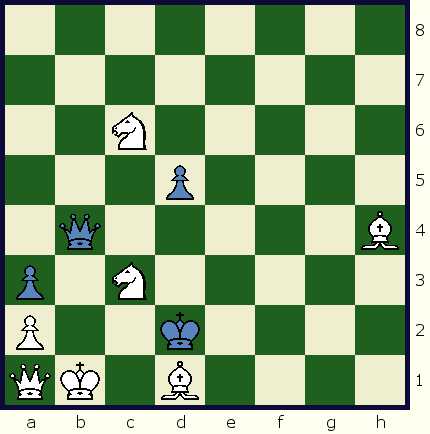Multimove Chess
This variant is a mutator, so first I will describe it in general terms, followed by the FIDE Chess description. This game is similar to Cost Progressive Chess. Generalized Multimove Chess Each turn a player may spend up to N points (N/2 for White's initial turn). Points are spent by making one or more moves. Moves cost points which are calculated by tallying up the actions required to make the move. Action Costs: Moving into, through or over a square costs 1 point (so for example, a non-capturing knight move costs 2 points). Capturing a piece costs an extra 1 point (so, for example, moving into an enemy occupied square would cost 2 points). Moving a piece that has already been moved during the turn costs an extra point (ie. adds 1 point to the total cost of the move). Promotion has a cost, but the cost is specific to which kind of chess variant is being played (see Multimove FIDE chess below). Generally, the larger the promotion, the higher the cost.Setup
Any chess game this applies to would use its standard initial array.
Pieces
Any chess game this applies to would use its standard pieces.
Rules
Giving check does not cost any points, but the checking player may make no further moves that turn. Check occurs even if the moving player no longer has enough points to actually threaten the opponent's royal piece. Unspent points are lost at the end of a turn. A player may not expose his royal piece to check during a sequence of moves, even if the check is only temporary. A check must be nullified on the first move of a turn. Failure to be able to do so is checkmate. A player is never compelled to spend points other than to make at least one move per turn. However, if, at the start of a player's turn, that player can make no legal move and is not in check, then the game is a stalemate (tie). Generally, the value of N would be the maximum number of points necessary for any piece to make any single legal move. For example, in FIDE chess, this would be a Queen, Bishop or Rook, moving across the entire board to capture a piece (hence for FIDE chess, the value of N would be 8).
Notes
Multimove FIDE Chess As in Generalized Multimove Chess, where the value of N is 8. Castling costs 2 points. Promoting a pawn costs 1 point for promotion to a Knight or Bishop, 2 points for promotion to a Rook, or 3 points for promotion to a Queen. Pawn promotion is mandatory. The initial two-square pawn move is not allowed. En passant capture is not allowed. The figure of 8 points to spend per turn was determined by the maximum cost of a single move (ie. a piece moving to capture across the entire board). A sample turn: White to move and win +---+---+---+---+---+---+---+---+ | | | | | | | | | 8 +---+---+---+---+---+---+---+---+ | | | | | | | | | 7 +---+---+---+---+---+---+---+---+ | | | N | | | | | | 6 +---+---+---+---+---+---+---+---+ | | | |*p*| | | | | 5 +---+---+---+---+---+---+---+---+ | |*q*| | | | | | B | 4 +---+---+---+---+---+---+---+---+ |*p*| | N | | | | | | 3 +---+---+---+---+---+---+---+---+ | P | | |*k*| | | | | 2 +---+---+---+---+---+---+---+---+ | Q | K | | B | | | | | 1 +---+---+---+---+---+---+---+---+ a b c d e f g h Since white is in check, the first move must be to remove check. N c6xb4 (cost=3 pts, 2 pts for knight move, 1 pt for capture) N c3-b5 (cost=2 pts, 2 pts for knight move) Q a1-d4++ (cost=3 pts, 1 pt per square moved through/into) Here is a graphic for those of you who can't see ascii diagrams:
 This 'user submitted' page is a collaboration between the posting user and the Chess Variant Pages. Registered contributors to the Chess Variant Pages have the ability to post their own works, subject to review and editing by the Chess Variant Pages Editorial Staff.
This 'user submitted' page is a collaboration between the posting user and the Chess Variant Pages. Registered contributors to the Chess Variant Pages have the ability to post their own works, subject to review and editing by the Chess Variant Pages Editorial Staff.
By David Howe.
Web page created: 2007-06-29. Web page last updated: 2007-06-29
